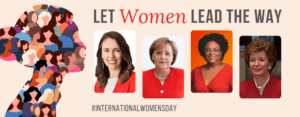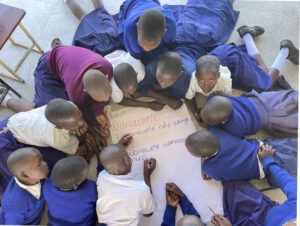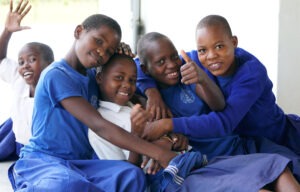
A new generation of women can lead us out of the crises that are stacked against us. Let’s ensure it happens by making sure girls get the education they deserve.
By Anne Wadsworth
Imagine a world in which so many of the challenges we’re currently navigating — such as the ones that comprise the polycrisis that has dominated the last five years: COVID, climate, and conflict — had been handled differently.
What if, instead of leadership defined by bravado and machismo, we had leadership that was nurturing and compassionate?
If that hypothetical is too much to conjure, fear not — there are actually examples of such from women leaders, globally. New Zealand’s then-Prime Minister Jacinda Ardern won international praise for her handling of the COVID emergency in her country, including the launch of a four-tiered alert system to communicate public-health developments with transparency. And Germany’s then-Chancellor Angela Merkel, a former quantum chemist, held press conferences projecting confidence and scientifically based logic.
Similarly, women leadership in the climate space has also been focused on protecting those in peril. Current Barbados Prime Minister Mia Mottley has led a passionate movement in climate negotiations that ultimately resulted in the adoption of a Loss and Damage fund at the December UN climate conference in Dubai. That fund will ensure that wealthier nations contribute funds to help more economically challenged ones better prepare for the negative consequences of climate change — the negative impacts for which nations like Barbados are least responsible and to which are the most vulnerable. And former Ireland President Mary Robinson has been a champion of populations in climate jeopardy, such as Barbados’ and other islands, vociferously campaigning for a climate treaty that will limit the rise of average global temperatures to 1.5 degrees Celsius.
At Girls Education Collaborative — which aims to achieve a gender-equal world where all girls have agency to attend school and are no longer barred from receiving a quality, safe, and life-equipping education simply because they are girls — we believe wholeheartedly in the kind of leadership exhibited by Ardern, Merkel, Mottley, and Robinson. And while we welcome male leadership, we want to ensure that there is diversity at the table and that women have the representation they are due.
Our work is focused primarily on Tanzania, a country where women are not so well represented. There are, even in this day and age, formidable barriers that block girls from fully participating in school, their local financial ecosystems, and their civil societies. They are traditions that steal a girl’s innocence and rob her of her dignity and basic human rights. Girls endure the dangers of high rates of sexual violence, female genital cutting, and child marriage, and the indignities of bride prices and the status of second-class citizens. Often in traditional economies, girls are also subject to a heavy burden of family chores that begins in early childhood — including daily treks, often at great personal risk, to collect firewood and water.

Globally, millions of girls are out of school because of such culturally-embedded gender inequality and/or the consequences of extreme poverty and societal tradition. But girls have a right to be in school and pursue a quality education in a safe setting. And when that education is secured, a pathway opens up for them to become the leaders of tomorrow.
In our experiences in Tanzania — where we always support locally initiated organizations on the ground as allies — we have found that there is growing acceptance of girls getting an education. The Kitenga Girls Secondary School in remote northwestern Tanzania (that we helped the Immaculate Heart Sisters of Africa launch in 2017) just began its eighth class — and it is the largest cohort to date. That is reaffirming that the people of Tanzania are gaining an understanding that educating women and girls not only increases their future earning power but can also be transformational for entire communities, leading to the disruption of generational poverty.
Tanzania is witnessing some of this writ large for itself, as for the first time the country has a woman head of state. Samia Suluhu Hassan was vice president when her predecessor passed away in 2021. She took the reins after his passing and since has reversed course on the pandemic, backing more science-based rather than denialist approaches.
Women leaders have demonstrated more humane policies during this polycrisis period that have seen their countries respond positively. And to best prepare our young women and girls for the leadership opportunities of the future, we need to ensure that millions of girls around the world are no longer barred from the educations they seek — and deserve.

That is our focus: educating the next generation of women, and making sure they have a seat at the table. The impact of such will be better for our global economy, our global society, and for our planet.
Anne Robinson Wadsworth is the founder and Executive Director of Girls Education Collaborative.